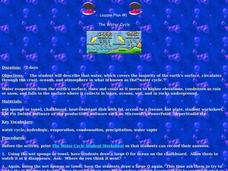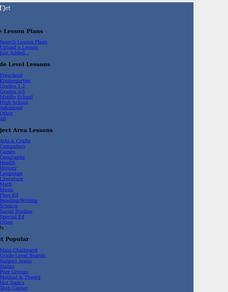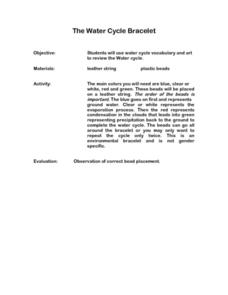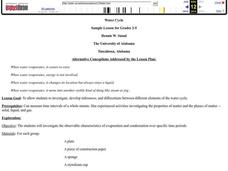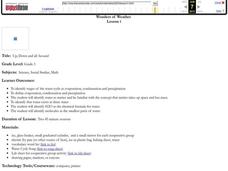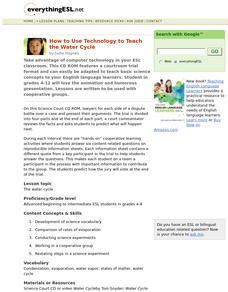Curated OER
The Water Cycle
Seventh graders discover how water circulates through the earth and its atmosphere while determine how much of the Earth's water is suitable for drinking. They discover the meaning of evaporation, transpiration, and precipitation and...
Curated OER
Condensation and the Water Cycle
Students explore the natural distallation process that occurs in the water cycle. They use plastic cups and cotton swabs to observe the condensation process that is evident in the water cycle.
Curated OER
Water Cycle -- Presentation Teaching Model
Students continue their examination of the water cycle. In groups, they present their findings to the class after researching a specific topic related to the water cycle. They spend the rest of the lessons asking questions and answering...
Curated OER
The Water Cycle
Students explore the water cycle. In this water cycle lesson, students experiment with a variety of activities to discover what happens during the water cycle. Students create their own animated versions of the water cycle using...
Curated OER
Around the Water Cycle--A Reader's Theater
Students read aloud a play script in a group to research the water cycle. They take the parts of raindrops. The amount of raindrops can be adjusted to fit group size.
Curated OER
The Water Cycle and Clementine
Third graders sing a piggyback song to explore the parts of the water cycle and then illustrate and label the water cycle in their science journals.
Curated OER
The Water Cycle/States of Matter
Learners engage in a lesson that is concerned with the water cycle and different states of matter. They conduct research using a variety of resources in preparation for taking a quiz. Then students take the quiz in correlation to having...
Curated OER
The Water Cycle: A Repeating Pattern in Nature
Students are introduced to the terms related to the water cycle in their native language. In groups, they describe the steps of the cycle using different materials found in their art classroom. They describe how energy helps water...
Curated OER
Water Cycle Stories
Students explore the water cycle. In this water cycle lesson, students simulate the water cycle by placing an ice cube in a Ziploc bag and observing the changes which occur over time. Students record the mass of the Ziploc bag and record...
Curated OER
The Water Cycle Bracelet
Pupils participate in a creative project in order to investigate the water cycle. They create a bracelet with different colored beads that represent the concept and the order of its occurrence. Students are evaluated according to the...
Curated OER
The Water Cycle
Students conduct experiments involving different parts of the water cycle. In this water cycle instructional activity, students conduct five simple experiments to demonstrate how the water cycle works. The results of each experiment is...
Curated OER
Water Cycle
Students investigate, develop inferences, and differentiate between different elements of the water cycle. They investigate the observable characteristics of evaporation and condensation over specific time periods
Curated OER
Dewey and Chemistry: The Water Cycle Revisited
Students undertake a series of experiments related to the water cycle. All experiments use John Dewey's experiential philosophy as their bases. Each lesson is clearly based on philosophy and attempts to be relevant.
Curated OER
Water: The Incredible Resource
Students understand the importance of water in any ecosystem. In this water lesson, students recognize where water is found, the type of water found, and how water is changed in the water cycle. Students complete worksheets using water...
Curated OER
The Water Cycle
Second graders use the program HyperStudio to draw and describe the water cycle. In this science and technology instructional activity, 2nd graders will first become familiar with the water cycle by exploring books and websites in the...
Curated OER
Go To The Head of the Cloud
Students pretend they are water droplets traveling through the water cycle. Using their text, they discover the steps in the cycle and the different paths water can take. They write a report about their journey through the water cycle...
Curated OER
Wonders of Weather
Fourth graders complete activities to study weather and the water cycle. In this water cycle lesson, 4th graders observe a demonstration of the three stages of water. Students work in groups to complete a water cycle lab activity....
Curated OER
Where in the world is the Hydra Electron?
Walk your class through the journey water takes once it leaves your kitchen sink, all the way through the water cycle. Demonstrations support your lecture. This plan is thoroughly written, but ideally you would follow it up with water...
Curated OER
Send in the Clouds
Students examine the components of the water cycle and follow step by step directions to build a three dimensional cloud. The vocabulary words used in the lesson are attached to the cloud for a lesson review.
Curated OER
Prairie In A Bottle
Second graders observe images of prairie ecosystems and discuss the needs of living things. They create a prairie habitat in a closed jar to observe the water cycle and plant growth.
Curated OER
Water Cycle
Students observe an example of evaporation and study the water cycle. In this research lesson students simulate a cloud formation and create a model of the water cycle.
Nuffield Foundation
Observing Water Moving Through Plants
We know plants assist in the water cycle, but how do plants get water from the ground into the air? Through a series of demonstrations or labs, scholars observe the movement of water through plants. They microscopically view the cells...
Curated OER
How to Use Technology to Teach the Water Cycle
Students answer six content-related questions on reproducible information sheets. They predict how the jury vote at the end of the trial.
Curated OER
Moebius Strips
Learners make Moebius strips and use them to demonstrate the interconnectedness of an environment. They explore the natural cycles (water, oxygen/carbon dioxide, carbon, nitrogen) within the environment. They describe how the cycles are...





